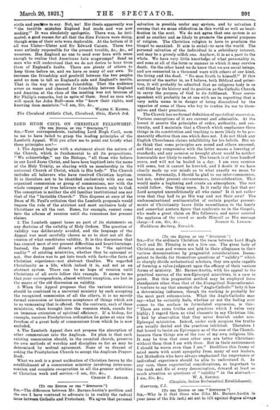(To THE EDITOR OP THE " SPECIATOR."3
Sie,—For the ordinary Christian the issue between Lord Hugh Cecil and Dr. Fleming is not a live one. The great body of Christian men and women are held in their allegian,ce to their various denominations by pragmatist considerations. Incom- petent to decide for themselves questions of "validity" which so sharply divide ecclesiastical scholars, they are quite capable of forming a value-judgment upon the efficacy of their various forms of ministry. Mr. Barnes-Austin, with his appeal to the practical success of the non-Episcopal ministries, is a case in point. But this pragmatist method may be employed from standpoints other than that of the Evangelical Nonconformist. I venture to say that amongst the "Anglo-Catholic" laity it has a determining influence, though its working is probably for the most part subconscious. What the Anglo-Catholic may say—what he certainly feels, whether or not the feeling ever comes to the surface in formulated expression, is this : " There are some truths and practices which I value very highly; I regard them as vital elements in my Christian life. I find by observation that they never flourish under non- Episcopal ministries. Indeed, under such auspices the truths are usually denied and the practices inhibited. Therefore I feel bound to insist on Episcopacy as of the esse of the Church, because these things are of the esse of my own religious life. It may be true that some other men are better Christians without them than I am with them. But in their environment I should be worse even than I am." Doubtless this frame of mind meets with scant sympathy from many of our leaders, but Methodists who have always emphasized the importance of individual experience should be able to understand it. In any case, these experiential considerations, so important tq the rank and file of every denomination, demand at least as much attention as questions of " validity " in the abetraet.— (Chaplain, Indian Ecclesiastical Establishment).


































 Previous page
Previous page